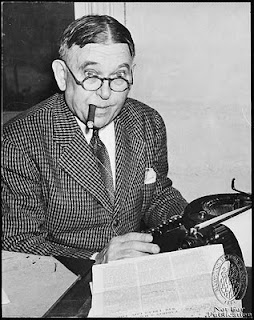The View from Afar
Writings by retired newspaper publisher Stephen Waters

8. Social Studies: Practices that obscure history
Stephen Waters August 26, 2015
[Article 8 of 10: Previous articles explained shortcomings of many levels of the Social Studies Frameworks. This article gives examples to show that the practices they propose obscure how to use history.]
Learning how to research is quite different from learning to apply history. The New York State K-12 Social Studies Field Guide proposes half a dozen research practices it encourages with time-consuming pedantry. [1] [2] The first is “Gathering, Interpreting and Using Evidence.” They prefer students to work with primary sources rather than read authoritative historians who across history have identified potentially useful patterns. In sample lessons, while perhaps authentic, material is often out of context, slippery, and overwhelming. The frameworks also encourage “Civic participation.” [3] Participation is inappropriate for a young or immature student easily manipulated. Unarmed with patterns that history can offer, they easily enable misgovernment that shows little, if any, respect for citizens. It is dangerous for the frameworks to promote democracy without promoting caution because of the ease with which democracy can be hijacked. History requires vigilance. A pound of hamburger can be cut many ways and still be hamburger. History can be cut many ways and still be history. However, students may find slicing history one way not be as useful as slicing it differently. Students deserve a cut useful for them, not for state educators, do-gooders, and villains who are revisionist at heart. Leftist social theorist Antonio Gramski said that war to remake society takes a long march through cultural institutions like schools that are susceptible to battlefield shaping. For example, the framework considers equality a principle. [4] The frameworks advocate practices and precepts of questionable value. They suggest one could support equality with a public demonstration, but which equality: equality of opportunity or equality of result? Too often demonstrators want delivered what enforced equality has never delivered—not just ‘a’ thumb on the scale of justice, but their thumb on the scale of justice because their thumb is the only true thumb. The frameworks invoke history but they don’t respect what it has to offer. For instance, the EngageNY ELA Grade 2 sample by CoreKnowledge dismisses mythology. Youngsters learn names of ancient gods, but not their lessons. Frameworks lessons direct teachers to tell students that “people in ancient times often developed religions as they sought explanations for how things came to be or how things happened in nature . . .” as if gods were fanciful fairy tale creations instead of sturdy beliefs by which ancient youngsters lived and died. [5] Myths were used to transmit life lessons from one generation to another. Youngsters today form beliefs that are different, but no less sturdy and no less mythic than ancient youngsters. The life lesson of the killing of Medusa, the Gorgon, is more than a mythical magical tale. Medusa, the gorgon, represents history — an underworld creature, with hair of writhing snakes — amorphous, constantly moving, changing shape, ready to strike at the inattentive, and equally deadly to those who fixed their attention directly at her. History has to be respected, filled as it is with writhing, senseless terror, waiting to be repeated. [6] Perseus slew Medusa, with gifts from gods Athena and Hermes.- Looking directly at Medusa could kill as easily as rage and despair from looking too closely at the past could poison the reader. Perseus’ mirrored shield softly reflected history keeping hope and invention intact to fashion a more solid future.
- History is far away. We don’t live there, but Perseus’ winged sandals take us there, even though in time it is distant.
- Invisibility offers the opportunity to learn enough about the need to defend ourselves before we are obliged to do so.
- The sword reminds us that the past, the present, and the future require us to find the courage to stand up for ourselves.
The Frameworks selectively misuse history to further social transformation. “Evidentiary” skills and judgment are exercised to hold the past to present-day standards. History and literature are not simply part of cultural heritage. They are how to plumb the past to discover its weaknesses and marshal its strengths. Medusa teaches us to use history to better one’s own future. History should help one discover patterns of practical use either sharpening thinking or helping label practices tried before and found wanting.
[In the next article, 9. Social Studies: The battle for individuals in society, the Social Studies Frameworks that claim to teach one thing actually train students to believe something else.] --[1] New York State K–12 Social Studies Field Guide. https://www. engageny.org/resource/new-yorkstate-k-12-social-studies-field-guide.
[2] The frameworks consider Chronological Reasoning and Causation, Comparison and Contextualization, Geographic Reasoning to be social studies practices as well, but examples fail to tease out their variety so they seem used more for show than anything else.
[3] Ibid. NYS Field Guide. Pg 32.
[4] New York State K-8 Framework. Pg. 33. https://www.engageny. org/resource/new-york-state-k-12social-studies-framework (For PDF download).
[5] http://www.p12.nysed.gov/ engageny/k-2-curriculum/G2_D5_ Anthology.pdf. Page 16.
[6] The American Civil War, with both sides fighting well-reasoned positions founded in the Bible, the Constitution, and history, systematically killed off 600,000 civilian and military sons and daughters, each side convinced of their moral right.

Stephen B. Waters
In early 2021, with 46 years in the business, I retired as publisher of the Rome (NY) Daily Sentinel
After five generations of family ownership, despite an unsettled economy, we keep on. We understand that although we may own the newspaper, we hold it in stewardship for the community.
Across my career, so many other small newspapers were purchased by media chains, large newspapers sold their integrity, and broadcast news outfits fell back on superficial entertainment.
They put journalism in this country at risk. The best antidote is for individual readers to arm themselves to recognize the danger to their community, culture, and society itself.
Index
-
 sbwTweet
sbwTweet
Mostly Links and Retweets -
 Essays
Essays
Writings across time -
 Editorials and columns
Editorials and columns
For the newspaper -
 Presentations
Presentations
Community discourse -
 Books
Books
Published and available -
 Audiobooks
Audiobooks
Readings and more